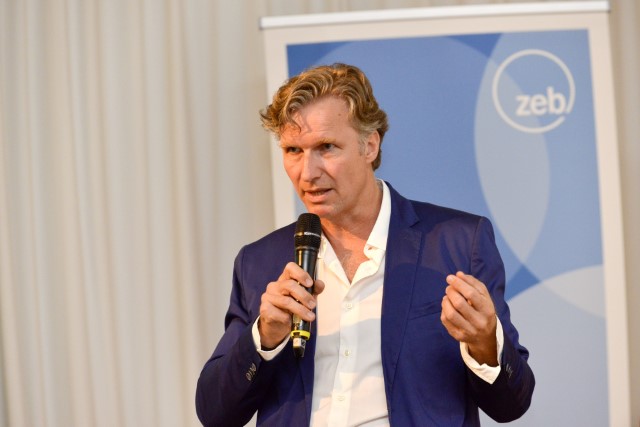For Michael Reuter, blockchain is much more than just the basis for Bitcoin and co. His focus is on much broader use cases, which he, together with his team, brings to life. “Blockchain is a software that can simultaneously handle database, accounting and transaction tasks,” he says. “Problems with versioning, completeness, correctness and real-time data availability become redundant—the possibilities are endless.”
So, is blockchain the future? In this, at least, Michael Reuter is certain:
“Blockchain is here to stay.”
Bitcoin and co.
Cryptocurrencies are probably the best known and currently the most widely discussed use case for blockchain. There are currently more than 1,800 of them. “I find it difficult to make a statement about which of these currencies will still be used in x years,” says Michael Reuter. Nevertheless, he is convinced: “This type of foreign exchange will not disappear.” Although the market currently holds little liquidity, the volatility and the degree of legal uncertainty is high, and there are not many large players represented, “but the regulators, such as BaFin (Germany’s Federal Financial Supervisory Authority), are much more active and closer to the topic than current news suggests; however, they are still waiting to first observe”—an attitude that Reuter embraces in principle.
BankingHub-Newsletter
Analyses, articles and interviews about trends & innovation in banking delivered right to your inbox every 2-3 weeks
"(Required)" indicates required fields
Use cases
The technical possibilities of blockchain are unique and almost unlimited, emphasizes Michael Reuter. “There are billions of possible use cases, and every company will want to capitalize on the potential of blockchain.” However, it is not easy to find good use cases, and, according to Reuter, in most companies, the right and the best ones have yet not been identified. Wherein lies the difficulty? Reuter does not mince his words: “Not every transaction a database is used for today should be handled through blockchain—just for the sake of having blockchain.”
What are the prerequisites for useful use cases?
The first use case has been widely heard of throughout the banking world. “Blockchain is well-suited for applications in transaction-oriented areas, such as the financial sector, but also for any supply chain within the industrial sector, for cross-industry quality assurance as well as in connection with auditing, where it can be applied or maybe even change the industry long term”, explains Michael Reuter. “Used properly, the blockchain ensures control, clarity and traceability and makes customary and sometimes extremely cumbersome control mechanisms superfluous. Functioning blockchain systems could make most of the audit work redundant.”
The second use case, which is also frequently discussed, is smart contracts. The basic structure can be simply described as “if this, then that” and, in theory and practice, can easily be mapped via a blockchain. A successful application, however, is encumbered by a practical problem: Smart contracts can be flawed—or at least be challenged by a contractual partner. So in practice, what can happen is that a policy appears to not have been paid even though it has been: “There are manifold reasons for this,” says Reuter, “and that’s a huge problem because one cannot easily intervene manually in this automated process.” Solutions must be found, such as the Smart Contract arbitration solution “Codelegit” developed by Datarella (www.codelegit.com); in other words, the opportunity to pause the smart contract and settle a contract dispute through an arbitral tribunal. Not until smart contracts, like Codelegit, are programmed in a legally compliant manner, they are still a long way from being applicable in practice.
The third use case is less well known. In fact, it is not about improving control mechanisms and increasing automation. “A blockchain is required when multiple parties are involved who do not necessarily trust each other.” This could be the case, for example, with companies that are not allowed to trust for antitrust reasons, or with independent groups within large corporations. Blockchain facilitates control through complete documentation, provides security and creates transparency for all parties involved. This will reduce ongoing cooperation and uncertainty for those involved.
Michael Reuter is convinced that the best use cases come from the company itself and not from the idea of “what you can do with a blockchain”.
Criticism
The blockchain is a complex system for which the setup, customization, and control require special skills that companies have yet to build up. Still, according to Reuter, the current learning curve is “very steep” everywhere.
A common criticism is the high power consumption of blockchain activities. In this case, however, it is important to differentiate clearly, says Reuter: “Power consumption is just a matter for public blockchains that anyone can participate in, and their consensus is based on an algorithm-based incentive mechanism—the so-called proof-of-work.” Most corporate solutions are private blockchains where increased power consumption is not a real factor.
Nonetheless, Michael Reuter sees a large and still unresolved difficulty on another level: “The German legal system is geared towards a central economic system. How to deal with decentralization in this context is not only unclear to me, but presumably to many market participants at the moment.“ A good example of this is the General Data Protection Regulation that came into force in May, which until now has been difficult to harmonize with decentralized technology systems. “In practice, this subject will need to be handled creatively and exceptions to the rules may be required. A sustainable approach looks different, though. Legislation should consider decentralized systems, and in my estimation, this process will take years. But it is absolutely necessary.”
Outlook
Michael Reuter believes that in ten years time the blockchain will no longer be talked about, “by then it will have long become a matter of course”. And how will the everyday life of an average user change through blockchain? Not at all, says Reuter, “because they probably will not notice. A company is not likely to justify blockchain-based product or process improvements for an end user with the use of blockchain technology. On the contrary, they will generally promote it as an optimized offer.” We will stay tuned.




